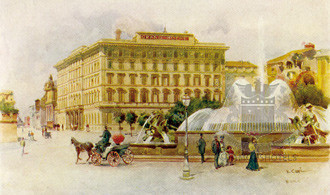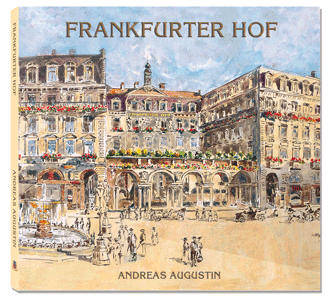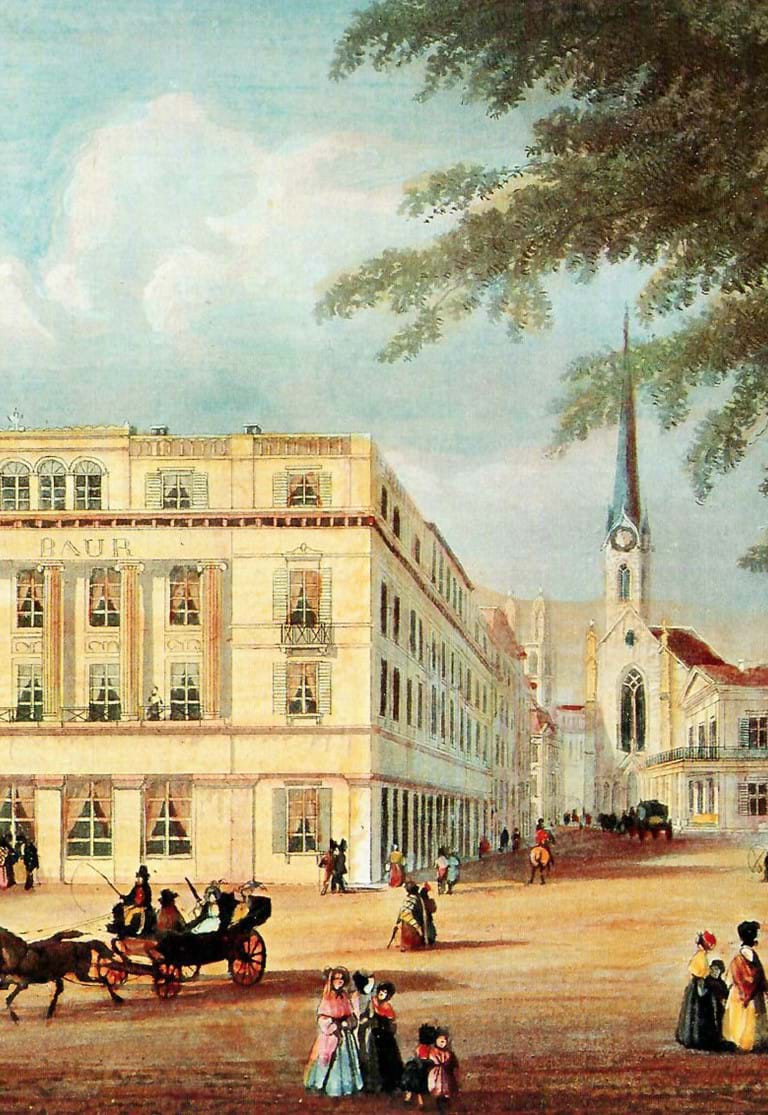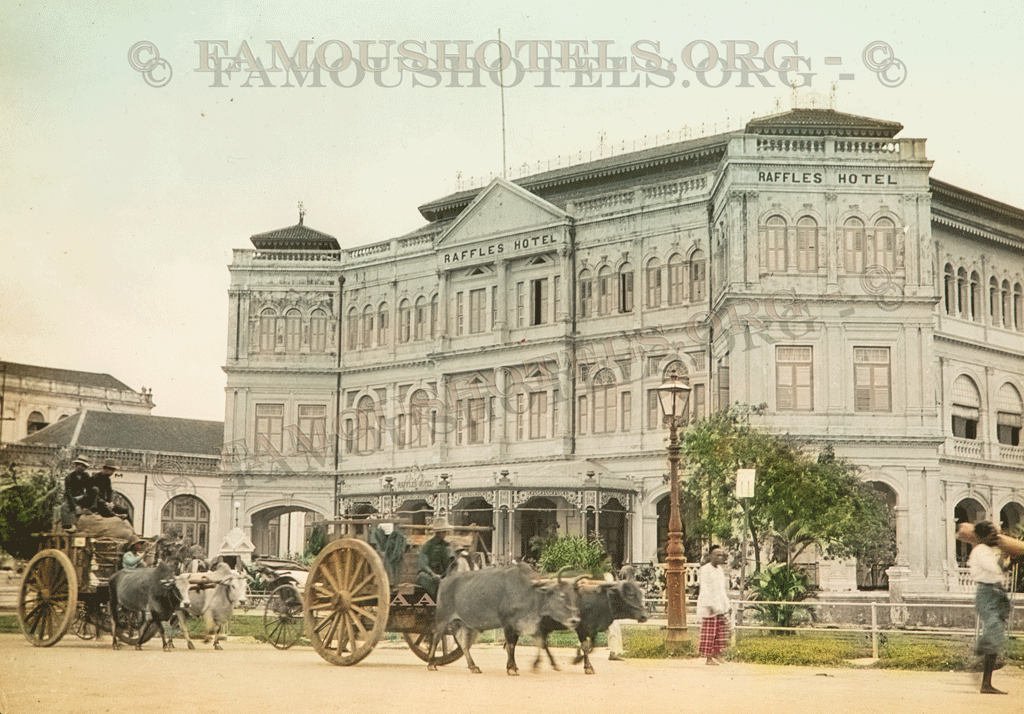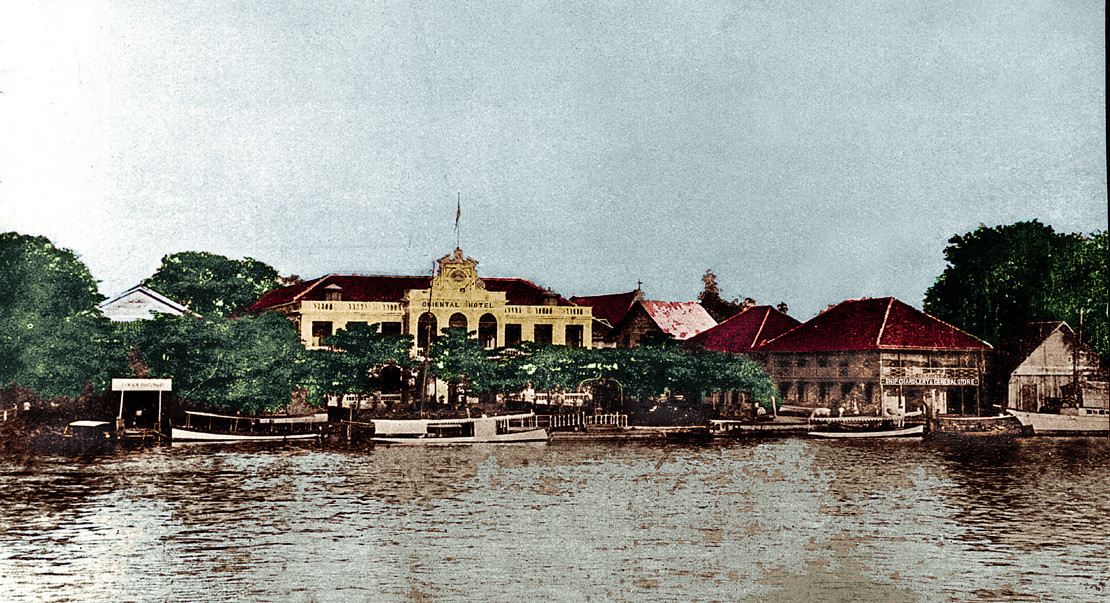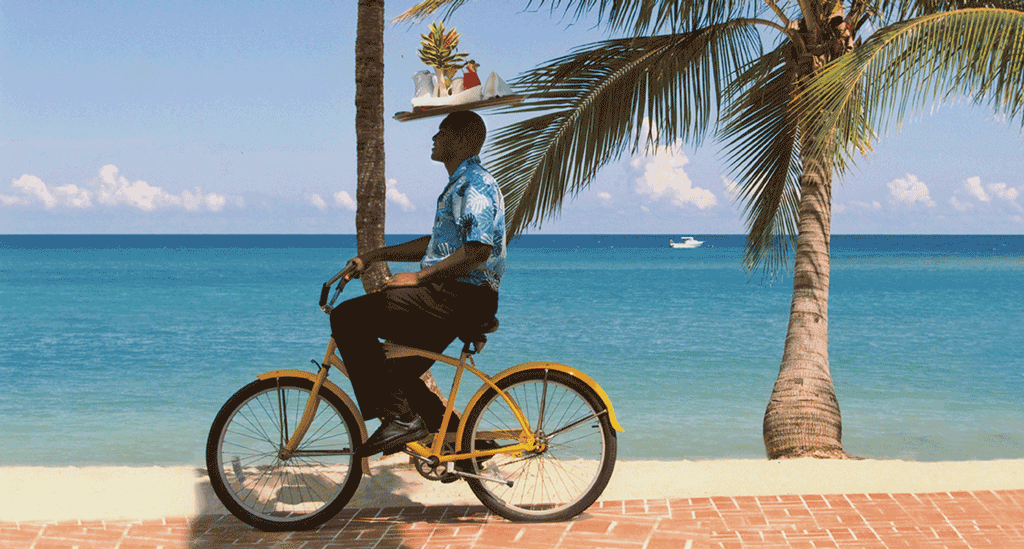All Roads Lead to Rome
( words)
This is an excerpt - the second chapter of our book ST. REGIS - GRAND HOTEL ROME, by Andreas Augustin, edited by Thomas Cane All Roads Lead to Rome Alain de Lille, French theologian and poet (c.1128-1202) The Marquis di Rudini turned to César Ritz: ‘Many people misjudge Rome, but in fact it is the only capital in Europe, and perhaps the world, which offers a healthy, balmy, sunny climate, with a clear blue sky all year round, over the world’s most stimulating and beautiful open-air museum.’
The two men stood in the lobby of London’s Savoy Hotel. The mild sun of spring beamed through the high windows, reflected from the new houses on the Strand across the road. The year was 1891. Rudini, Italian Premier and Minister of Foreign Affairs, was accompanying his country’s young Crown Prince, the Prince of Naples, on a state visit to London. ‘We need a man of your calibre,’ he continued, ‘to create a new Savoy, a new Grand National in Rome. The timing is auspicious. The transatlantic liners are disembarking hundreds of Americans bound for the Eternal City. They come to London. They see your hotel. It sets certain standards. Then they visit the continent: Paris, the Côte d’Azur with its palaces built for the aristocracy. We too have lovely hotels in Rome, the Hotel Quirinale for one. But it’s 30 years old. What we need is a modern true luxury hotel.’ Rudini had observed the man he had been talking to. He had heard nothing but favourable reports on this 41 year old Swiss entrepreneur, famed for his peerless ability to massage the spoilt egos of the affluent classes. In all the most sophisticated salons of Europe, everybody had heard of César Ritz. And with good reason. Wherever fashionable society went, Ritz went – or rather vice-versa.
It was incredible to think that this visionary hotelier had started life as the son of a humble goat farmer in Niederwald, a hamlet hidden away in the Swiss Alps. Ritz’s incredible hospitality journey had begun in Paris in the late 1860s, just before the Prussians laid siege to the city. He had learnt his trade in the French capital, finding a job at the finest restaurant in town and later as the maître d’ of a hotel just off the Champs-Elysées. Since then, Ritz had never looked back. He had worked in resorts throughout Europe and managed luxurious hotels like the Grand National in Lucerne and the Grand in Monte Carlo. He had opened his own properties, including the Hotel Minerva in Baden-Baden and the Hotel de Provence in Cannes. And now Ritz was general manager of the new prestigious Savoy in London, the capital of the world, right in the heart of the theatre district, were Gilbert and Sullivan shows filled the Savoy theatre next door. And Ritz was the real star of his very personal hospitality show that everyone was raving about. His stock had never been higher.
Rudini was certain that Ritz was just the man Rome needed. ‘If I am not mistaken, Mr Ritz, a golden opportunity beckons you to Rome. The Romans are indulgent and immodest. They crave extraordinary luxury yet do nothing to have it within their grasp. Let us deliver it to them.’
The Marquis di Rudini turned to César Ritz: ‘Many people misjudge Rome, but in fact it is the only capital in Europe, and perhaps the world, which offers a healthy, balmy, sunny climate, with a clear blue sky all year round, over the world’s most stimulating and beautiful open-air museum.’
The two men stood in the lobby of London’s Savoy Hotel. The mild sun of spring beamed through the high windows, reflected from the new houses on the Strand across the road. The year was 1891. Rudini, Italian Premier and Minister of Foreign Affairs, was accompanying his country’s young Crown Prince, the Prince of Naples, on a state visit to London. ‘We need a man of your calibre,’ he continued, ‘to create a new Savoy, a new Grand National in Rome. The timing is auspicious. The transatlantic liners are disembarking hundreds of Americans bound for the Eternal City. They come to London. They see your hotel. It sets certain standards. Then they visit the continent: Paris, the Côte d’Azur with its palaces built for the aristocracy. We too have lovely hotels in Rome, the Hotel Quirinale for one. But it’s 30 years old. What we need is a modern true luxury hotel.’ Rudini had observed the man he had been talking to. He had heard nothing but favourable reports on this 41 year old Swiss entrepreneur, famed for his peerless ability to massage the spoilt egos of the affluent classes. In all the most sophisticated salons of Europe, everybody had heard of César Ritz. And with good reason. Wherever fashionable society went, Ritz went – or rather vice-versa.
It was incredible to think that this visionary hotelier had started life as the son of a humble goat farmer in Niederwald, a hamlet hidden away in the Swiss Alps. Ritz’s incredible hospitality journey had begun in Paris in the late 1860s, just before the Prussians laid siege to the city. He had learnt his trade in the French capital, finding a job at the finest restaurant in town and later as the maître d’ of a hotel just off the Champs-Elysées. Since then, Ritz had never looked back. He had worked in resorts throughout Europe and managed luxurious hotels like the Grand National in Lucerne and the Grand in Monte Carlo. He had opened his own properties, including the Hotel Minerva in Baden-Baden and the Hotel de Provence in Cannes. And now Ritz was general manager of the new prestigious Savoy in London, the capital of the world, right in the heart of the theatre district, were Gilbert and Sullivan shows filled the Savoy theatre next door. And Ritz was the real star of his very personal hospitality show that everyone was raving about. His stock had never been higher.
Rudini was certain that Ritz was just the man Rome needed. ‘If I am not mistaken, Mr Ritz, a golden opportunity beckons you to Rome. The Romans are indulgent and immodest. They crave extraordinary luxury yet do nothing to have it within their grasp. Let us deliver it to them.’
 The sleeper of the Calais–Nice–Rome Express, operated by the Belgian Compagnie Internationale des Wagons Lits, sped between Paris and Nice in just 17 hours. Passengers crossed the Mediterranean by ferry and then continued towards Rome on the fast and efficient Italian rail network. It was all a far cry from the days before the unification of Italy (1861), when travellers had the added difficulty of crossing borders and wrestling with different currencies and measurements. Back then horse-drawn carriages were usually recommended as the fastest means of travel from town to town.
César Ritz was excited. Reclining in his comfortable compartment, he flicked open a Karl Baedeker guidebook to Italy. Everyone was reading them these days. “From the beginnings of history to the modern day,’ read the introduction, ‘Italy has always been an irresistible magnet for the inhabitants of the North. A journey to this ‘promised land’ has often been the supreme desire of a person’s life. Today, the accomplishment of that desire is far easier than it was yesteryear.’ It all sounded very promising. Perhaps the old saying was right: all roads really did lead to Rome.
Ritz arrived at the grand Roma Termini railway station, a masterpiece of modern architecture and technique. His first impressions of the Italian capital were just as the marquis had promised; the weather was mild and warm, a refreshing change from the grey smog of London.
Ritz hailed a coach and instructed the driver to head towards Via Nazionale. Glancing at his gold pocket-watch, he decided to time the journey. After three minutes the carriage passed the enormous ruins of the Baths of Diocletian* then crossed the newly laid out Piazza Esedra with the large picturesque fountain in its centre. Here the cab entered the Via Nazionale through an imaginary gate formed by two large semicircular palaces, showing the former outer bounds of the Baths of Diocletian. Ritz’s gaze met a half-finished building up on the hill, next to the ruins of the Baths. He was intrigued. The building seemed too new to be an ancient ruin, yet too unfinished to be a new house.
The cab continued along the Via Nazionale, passing boarding houses and hotels. It pulled up outside one of them, the Hotel Minerva. Ritz alighted and entered the building. The hotel was run by Franz Josef Bucher-Durrer, a man he knew well having once worked for his family at their hotel in the Swiss resort of Buergenstock. Ritz knew that Bucher-Durrer would give him the low-down on the Roman hotel market.
Ritz inquired about the unfinished building down the road. ‘The location is good,’ replied his fellow Swiss. ‘A certain Mr Cavallini started to build a hotel there in 1890. And then, all of a sudden, construction slowed down. At the time, no one could understand why… It turned out that he had simply run out of money.’ Bucher-Durrer paused for a moment’s reflection, then came his reply: ‘In fact, the location is great. Everyone’s interested in developing that area at the moment. It is higher up than the hot, dusty parts of downtown Rome and enjoys a healthy climate. Go and see the new Hotel Eden, owned by Nistelweck. His wife is a daughter of Hassler, who used to have a hotel downtown, catering mainly for the Germans. Now he runs a fine establishment at the top of the Spanish Steps. It’s boom-time here, Ritz. And you – what are you doing in Rome? Looking for a new job?’
‘Sort of’ answered Ritz.
The sleeper of the Calais–Nice–Rome Express, operated by the Belgian Compagnie Internationale des Wagons Lits, sped between Paris and Nice in just 17 hours. Passengers crossed the Mediterranean by ferry and then continued towards Rome on the fast and efficient Italian rail network. It was all a far cry from the days before the unification of Italy (1861), when travellers had the added difficulty of crossing borders and wrestling with different currencies and measurements. Back then horse-drawn carriages were usually recommended as the fastest means of travel from town to town.
César Ritz was excited. Reclining in his comfortable compartment, he flicked open a Karl Baedeker guidebook to Italy. Everyone was reading them these days. “From the beginnings of history to the modern day,’ read the introduction, ‘Italy has always been an irresistible magnet for the inhabitants of the North. A journey to this ‘promised land’ has often been the supreme desire of a person’s life. Today, the accomplishment of that desire is far easier than it was yesteryear.’ It all sounded very promising. Perhaps the old saying was right: all roads really did lead to Rome.
Ritz arrived at the grand Roma Termini railway station, a masterpiece of modern architecture and technique. His first impressions of the Italian capital were just as the marquis had promised; the weather was mild and warm, a refreshing change from the grey smog of London.
Ritz hailed a coach and instructed the driver to head towards Via Nazionale. Glancing at his gold pocket-watch, he decided to time the journey. After three minutes the carriage passed the enormous ruins of the Baths of Diocletian* then crossed the newly laid out Piazza Esedra with the large picturesque fountain in its centre. Here the cab entered the Via Nazionale through an imaginary gate formed by two large semicircular palaces, showing the former outer bounds of the Baths of Diocletian. Ritz’s gaze met a half-finished building up on the hill, next to the ruins of the Baths. He was intrigued. The building seemed too new to be an ancient ruin, yet too unfinished to be a new house.
The cab continued along the Via Nazionale, passing boarding houses and hotels. It pulled up outside one of them, the Hotel Minerva. Ritz alighted and entered the building. The hotel was run by Franz Josef Bucher-Durrer, a man he knew well having once worked for his family at their hotel in the Swiss resort of Buergenstock. Ritz knew that Bucher-Durrer would give him the low-down on the Roman hotel market.
Ritz inquired about the unfinished building down the road. ‘The location is good,’ replied his fellow Swiss. ‘A certain Mr Cavallini started to build a hotel there in 1890. And then, all of a sudden, construction slowed down. At the time, no one could understand why… It turned out that he had simply run out of money.’ Bucher-Durrer paused for a moment’s reflection, then came his reply: ‘In fact, the location is great. Everyone’s interested in developing that area at the moment. It is higher up than the hot, dusty parts of downtown Rome and enjoys a healthy climate. Go and see the new Hotel Eden, owned by Nistelweck. His wife is a daughter of Hassler, who used to have a hotel downtown, catering mainly for the Germans. Now he runs a fine establishment at the top of the Spanish Steps. It’s boom-time here, Ritz. And you – what are you doing in Rome? Looking for a new job?’
‘Sort of’ answered Ritz.
Later that week, the Ritz met the hapless Cavallini at the site on top of the hill. Ritz, whose sense of location never betrayed him, scrutinised the area. It was certainly a good place to build a hotel: perched centrally on a hill overlooking the new railway station. The site had a long history. In previous incarnations, it had been a hospice for the deaf and dumb, a factory producing Indian printed calico cloths, and part of the Basilica di Santa Maria degli Angeli, built in the Middle Ages. Cavallini had removed the old walls and drawn up plans for a new construction right on top of the hill. The hotel had been designed by the architect Giulio Podesti, who was also behind the new Policlinico, a hospital. The traditional style of the design suited Ritz. It would certainly meet with the approval of the cultivated, wealthy set he wanted to attract – and whose wishes he could always divine. Podesti’s work had a great sense of symmetry. ‘What made you stop building?’ asked Ritz. ‘Believe it or not, while we were building the foundation walls, we unearthed the western wall of Emperor Diocletian’s baths. That alerted the archeological society. Nowadays anything to do with our illustrious ancestors is of great importance to people in Rome. Our ministers want to develop the city as a historical site. I had to stop the construction until they had a complete overview of what was underneath. . . I lost precious time and ... money.’ Ritz gingerly picked his way through piles of tiles, wandered through empty halls and contemplated the abandoned construction work. He envisaged the circle of a lobby, a ballroom at one end and a main entrance at the other. He saw the flickering lights, heard the music, the sound of ball gowns – swishing silk on marble tiles. The place had the making of something very special. There was just one problem: an apparent lack of space inside the building for restaurants and banqueting. Scanning the premises for a solution, Ritz – the born restaurateur – found some empty land behind the building. There might just be enough room for banqueting halls, maybe a winter garden, perhaps even a restaurant. ‘Yes,’ exclaimed Ritz to himself ‚the property is perfect!’ and turning to Cavallini: ‘You would be more than lucky if you find a buyer for this property before it falls to bits.’ Cavallini’s financial means were exhausted, and so was the man. Ritz made him an offer he couldn’t refuse. The hotelier confidently trusted that his employers at the Savoy Company would be able to finance the acquisition. Considering the value of the deal mapped out, the two men agreed to draft a letter of intent. Two, in fact. Later that evening, with the documents signed and his business in Rome complete for the time being, Ritz boarded a north-bound train. In his coupé he leant back, satisfied. He reached into his pocket for the envelope containing the letter of intent and examined the contents. There were in fact two letters: one which he had signed on behalf of the Savoy Company and another which Cavallini had signed for him personally. Ritz carefully placed this second one in a secret pocket of his travel suit. He was sure that he would need it, sooner or later.

">


